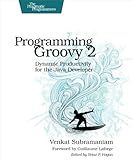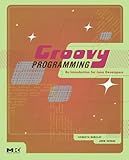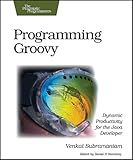Best Groovy Programming Guides to Buy in March 2026

Groovy in Action: Covers Groovy 2.4



Programming Groovy 2: Dynamic Productivity for the Java Developer (Pragmatic Programmers)



Making Java Groovy
- AFFORDABLE PRICES FOR QUALITY PRE-OWNED TITLES.
- THOROUGHLY INSPECTED FOR GOOD READABILITY AND DURABILITY.
- ECO-FRIENDLY CHOICE SUPPORTING SUSTAINABILITY IN READING.



Groovy Programming: An Introduction for Java Developers



Programming Groovy: Dynamic Productivity for the Java Developer (The Pragmatic Programmers)
- AFFORDABLE PRICES ON QUALITY USED BOOKS FOR EVERY READER.
- ENVIRONMENTALLY FRIENDLY CHOICE: REDUCE, REUSE, READ!
- VERIFIED GOOD CONDITION ENSURES SATISFACTION WITH EVERY PURCHASE.



Groovy: Grundlagen und fortgeschrittene Techniken (German Edition)


To pass multiple string parameters to a function in Groovy, you can simply list the parameters separated by commas within the parentheses when defining the function. For example, you can define a function like this:
def myFunction(String param1, String param2) { // Code here }
Then, when calling the function, you can pass the string parameters as arguments:
myFunction("Hello", "World")
The function will then be able to access and use the passed string parameters within its code.
What is the most effective way to pass multiple strings in Groovy?
One of the most effective ways to pass multiple strings in Groovy is to use a List or an array. Here is an example of how you can pass multiple strings using a List:
def strings = ['string1', 'string2', 'string3'] println strings
You can also use an array to pass multiple strings:
def strings = ['string1', 'string2', 'string3'] as String[] println strings
Another option is to pass the strings as individual arguments to a method or function:
def printStrings(String... strings) { strings.each { println it } }
printStrings('string1', 'string2', 'string3')
Using a List or an array is a convenient way to pass multiple strings in Groovy as it allows you to easily handle and manipulate multiple strings at once.
What are the different ways to pass multiple strings to a function in Groovy?
- Using multiple arguments: You can simply pass multiple strings as separate arguments to a function in Groovy. For example:
def myFunction(String str1, String str2) { println "String 1: $str1" println "String 2: $str2" }
myFunction("Hello", "World")
- Using a list or array: You can pass a list or an array of strings to a function in Groovy. For example:
def myFunction(List strings) { strings.each { println it } }
myFunction(["Hello", "World"])
- Using varargs: You can use the varargs syntax in Groovy to pass multiple strings to a function. For example:
def myFunction(String... strings) { strings.each { println it } }
myFunction("Hello", "World")
All of these methods are valid ways to pass multiple strings to a function in Groovy, and the choice of method will depend on your specific use case.
How do I pass multiple string variables to a Groovy method?
In Groovy, you can pass multiple string variables to a method by simply separating the variables with a comma. Here is an example of how you can define a method that takes multiple string variables as parameters:
def myMethod(String str1, String str2) { println "String 1: $str1" println "String 2: $str2" }
// Calling the method with multiple string variables myMethod("Hello", "World")
In this example, the myMethod method takes two string parameters str1 and str2. When calling the method, you can pass multiple string variables separated by commas, like myMethod("Hello", "World").
What is the syntax for sending multiple strings to a Groovy function?
To send multiple strings to a Groovy function, you can define the function with parameters that accept multiple strings. The syntax for defining a function with multiple string parameters in Groovy is as follows:
def myFunction(String str1, String str2, String str3) { // Function implementation println "String 1: $str1" println "String 2: $str2" println "String 3: $str3" }
// Call the function with multiple strings myFunction("Hello", "World", "Groovy")
In this example, the myFunction function takes three string parameters str1, str2, and str3. When you call the function, you can pass multiple strings as arguments to the function. Each string argument is separated by a comma.
How to pass multiple string parameters to a function in Groovy?
In Groovy, you can pass multiple string parameters to a function by simply separating the parameters with commas within the function call. Here is an example:
def printNames(String name1, String name2) { println "Name 1: $name1" println "Name 2: $name2" }
printNames("Alice", "Bob")
In this example, the printNames function takes two string parameters name1 and name2. When calling the function, you can pass two string values "Alice" and "Bob" by separating them with commas.
How can I pass multiple string values to a closure in Groovy?
In Groovy, you can pass multiple string values to a closure by defining the closure with multiple parameters. Here's an example of how you can pass multiple string values to a closure in Groovy:
def myClosure = { String str1, String str2 -> println "String 1: $str1" println "String 2: $str2" }
myClosure("Hello", "World")
In this example, the closure myClosure is defined with two parameters str1 and str2. When calling the closure myClosure("Hello", "World"), the strings "Hello" and "World" are passed as arguments to the closure, and the output will be:
String 1: Hello String 2: World
